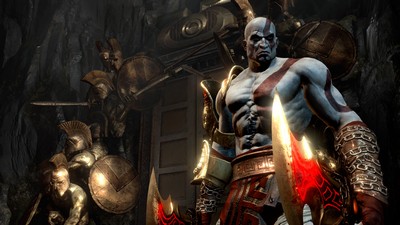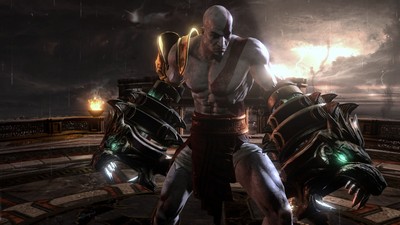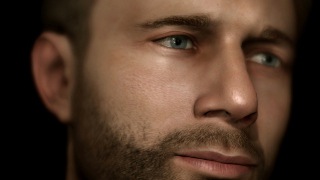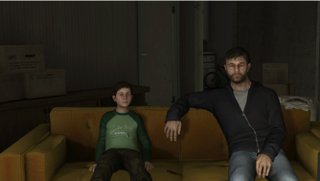The first God of War was one of my favorite games for the PS2. I had some problems with it (namely, the Hades level towards the end of the game) and upon replaying the updated version, I noticed that some of the previous generation video game conventions were annoying (namely, the save points), but it’s still a great game. I was less enamored with God of War II, but it retained the feel of the original and was still an excellent game. When I bought my PS3 last year, one of the major reasons was that God of War III was coming (and it’s a platform exclusive for Sony as well). Having finished the game this week, I’m happy to report that it was well worth the wait. It’s certainly not perfect, but it’s an extremely well executed game.

The critical response to the game has been mostly glowing, though there is an undercurrent of complaints about the repetitiveness of the franchise. Reactions seem to be split into a “OMG, this is the best game evar!” camp and a “It’s great, but it’s the same damn game, why am I playing this?” camp. Mitch Krpata falls into the latter camp, and makes an interesting case:
I don’t know. This game does almost everything right. It’s better in some clearly definable ways than its predecessors, and somehow worse in the gestalt. Playing God of War III, I was aware that I was playing a game that had been produced at a high level, but I just didn’t care what was happening.
I actually think this is a valid point, even if it’s not something that really bothered me. There were some things that didn’t entirely work in God of War III, but it’s still a great game and I think it’s definitely a big step up from the second game. Indeed, much of what I don’t like about this new game could be pinned on the preceding entry in the series (namely, the story).
I don’t think any of the games have a truly great story or anything, but the first game has a solid character arc for Kratos. Of course, the story isn’t completed there and there is little in the way of closure, but it works really well as a fresh take on the Greek mythological tragedy. Kratos fits right in with the rest of the Greek pantheon. He’s a tragic figure, and there are times when you don’t especially like him, but by the end of the game, I think enough empathy has been built up that you do care about him. As I mentioned in my review of the God of War Collection, Kratos is less likeable in the second game, and his motivations and actions are also rather odd. He starts the game as a war-mongering douchebag, for which Zeus lays the smackdown. So Kratos ends up in Hades (again) and makes a deal with the Titans to get revenge on Zeus. He eventually fights his way back to Zeus and something tragic (and rather silly) happens, leading to a literal cliffhanger of an ending. Even beyond those flaws with the story, there’s no real character arc in part II either. Ultimately, this story just isn’t very convincing, and given that the second game ends on a cliffhanger, God of War III starts off with a bit of a handicap.
Now, I’m not saying that they story they came up with was especially good and I think that Yahtzee’s dramatization of the writer’s conundrum is pretty spot on:
At this point, the story writer said “Shit, whose idea was it to put a thrilling climax at the start of the game? Now I have to contrive some unconvincing way to drag this out for another six or seven hours.”
And indeed, they came up with basically the same idea as last time: send Kratos back to Hades (for a third time!), strip him of his powers, and make him fight his way back to the beginning of the game. This has, more or less, been the structure of all three games. Start off with a rousing action sequence, show the primary objective of the game, then make you jump through 10 hours of hoops to actually get to the objective. It would have been nice to perhaps break from tradition here, but again, the end of God of War II handcuffed the writers. Eventually, the story does progress to a point where Kratos actually regains his character arc and proceeds to actually redeem some of his past misdeeds. There’s an element of hope injected into the story, and so I think what ended up happening was that the new team, having inherited a crappy cliffhanger ending, did their best to get out of that and provide their own take on the story. As such, I think the beginning of the game suffers a bit from inherited writing of dubious quality, but it eventually shrugs that off and the overall theme of the story works well enough (even if there are massive, titan-sized plot holes strewn throughout).
I can see how it wouldn’t work for some folks though, and that’s the sort of thing that can sap the fun of the game a bit, especially if you’re getting tired of the game mechanics. Fortunately for me, I love the game mechanics, and while not much has changed since the first game, I think that actually works well here. The core combat mechanics are as fluid and satisfying as always; there’s no need to muck that up, and I’m glad they haven’t. The puzzles, too, are as inventive as ever, and I have to admit that this game flows much better than the second installment. There are still some platforming sections as well, but none of the amazingly frustrating stuff from the first game (i.e. it’s actually fun in this game). Finally, the tone and pace of this game is impeccable. I remember complaining that the flow of the second game was worse than the original, but I shrugged that off as a typical sequel problem. Well, part three solved that problem – in terms of pacing, it’s at least as good as the original, if not better.
There are some minor changes in the combat system though, not all of which are for the better. There are four weapons in the game, and as with the original and second games, the new weapons aren’t very special or engaging (with one exception, which we’ll get to in a minute). The blades of chaos (or whatever they’re called now) are as great as ever and little has changed. Two of the new weapons are essentially the same thing as the original blades – pointy objects connected to chains. As such, they don’t really add much to the proceedings. The third new weapon, and the only one I really connected with, is called the Nemean Cestus (a pair of fist gauntlets shaped like lion heads), and I actually had a lot of fun with this one. While perhaps not as versatile as the traditional blades, they do pack a whallop and can be a lot of fun (especially once powered up).

Kratos, rockin the Nemean Cestus
We also get some new magic spells this time around, though each spell is now tied to the weapon you’re using instead of being a separate function. So if you have the blades equipped, you can call on the Army of Sparta magic. But if you have the Nemean Cestus equipped, you have to use the Nemean Roar magic. This isn’t that big of a deal, but I think the best magic is also associated with the default weapon, making it harder to branch out into other weapons (I have to admit, I barely used the Nemesis Whip and it does have a promising electricity area-effect magic attack associated with it). In addition to magic, you do also acquire some additional magic items. There’s a bow that can shoot flaming arrows, there’s the head of Helios which acts as a sorta gruesome flashlight (Helios was the Greek god of the sun, and you’re literally holding his decapitated head throughout most of the game), and there’s the boots of Hermes, which allow you to run up walls, etc… Some of these are important, some not so much (the Hermes boots are rather lame).
All in all, I’m actually pretty impressed with how many attacks and capabilities they were able to fit onto the controller scheme without making it all that confusing or hard to use. There were some times when I got tripped up, but for the most part, it was very easy to pick up (part of this may have something to do with my familiarity with the original games – not sure how well someone new to the series would do). And speaking of usability, things are pretty damn good this time around. When I revisited the first two games, I noted that I’ve become spoiled by current generation console games and computer games that have automatic save systems and checkpoints. The first two games had save points, and while that was fine for the previous generation, that’s not acceptable now. I’m happy to say that God of War III has implemented a very forgiving auto-save system. Strangely, they have implemented save points as well. Theoretically, these are unnecessary, but I ended up creating a lot of save files anyway (not sure why they couldn’t just let you save anywhere, but whatever). It would have been nice to have a sorta chapter system, so I could easily replay various sequences in the game, but according to an interview at 1up, this idea came up too late in the development process and was causing the team to deal with a lot of unintended consequences when they tried implementing it…
And so we come to the dreaded Quick Time Events discussion. The God of War games are certainly no stranger to QTEs, and indeed, the original game was my first real introduction to the modern QTE. I thought that game did a great job of it, but there are certainly a lot of games that do a poor job implementing them. The first Uncharted, for instance, has a few terrible QTE prompts that essentially equate to “Press this button to not die!” God of War games have always been much better at integrating them into the game, though God of War II actually reverted towards the end of the game and implemented a few really bad ones. But they got back on the right track with God of War III, and there are some really memorable boss fights in this game that essentially feature a series of QTE prompts, interspersed with some short combat sequences here and there.
Which brings up the visuals of the game, which are truly impressive, perhaps the most impressive that I’ve seen so far on the PS3. And the added power of the PS3 allows the QTE sequences to really soar, especially the Cronos bossfight about midway through the game. The sheer scale and scope of that battle is difficult to describe, even though it essentially boils down to the aforementioned QTEs interspersed with some combat. Visually, it’s quite arresting. I don’t think any of the boss battles are as great as the Hydra or Giant Armored Minotaur from the first game, which remain the best in the series (perhaps because of the seemingly rare combination of boss fight and environmental puzzle that the two aforementioned boss-fights rely on), but God of War III far outclasses the second game when it comes to boss fights. I think the improved capabilities of the PS3 hardware really allowed the game to soar, and the second game’s bosses seem flat by comparison. Of course, the visual splendor isn’t limited to the boss fights. There are many sweeping vistas throughout the game and numerous cut-scenes as well. You can’t skip the cut-scenes, but you also don’t have to watch them again (unless you are replaying the game from the beginning) because the game remembers that you already saw it and auto-saves after the cut-scene. From what I’ve read, it seems that these cut-scenes are where the game does a lot of the pre-caching that allows you to continually play the game without having to wait for loading screens (this is something I’ve always loved about this series – previous games have gotten around it by making you run through long, winding corridors, which might be a slightly better solution due to the perceived control the player retains). There are more cut-scenes here than in previous games, but I think they work well and don’t interrupt the pacing of the game. The added horsepower of the PS3 does lead the developers to perhaps indulge a bit too much at times, sometimes pulling the camera back too far for too long. At first, this is an impressive feat, because you can still see and control Kratos, even when zoomed out, but eventually I found this effect grating. Fortunately, it doesn’t come up that often.
The character and environment designs are great, as usual. One of my complaints about the original game was that the fixed camera was annoying. For the most part, you still don’t have any control over the camera, but it’s something I’ve grown used to and even embrace at this point. And the level designers seem to take advantage of the various blind spots, etc… in a way that makes me enjoy it more. I suppose you could make the argument that this is actually lazy level design, if you were so inclined, but when you look at how well the game plays, I don’t think that argument would wash. Take, for instance, the labyrinth, which manages to evoke the sort of paranoid fear of Cube (for me, at least) with genuinely fun and entertaining puzzle set-pieces and action sequences. Other examples include varied gameplay sequences (i.e. a music minigame, the sequences where you’re flying through a collapsing tunnel at high speeds, etc…) and the usual roster of challenging enemies and mini-bosses. There are still times when I really do wish that I could control the camera more and it’s taken me a while to get used to it, so I can certainly understand the sentiment, but I feel like the game designers are able to make up for it with their level designs at this point.
You could still complain about some of the longstanding issues of the series, such as the fact that there are plenty of times when you seem to run up on a non-existent wall (Krpata mentions the Gardens of Olympus puzzle sequence, which features a bunch of walls you should easily be able to jump over, yet the game doesn’t allow you. There’s more to his complaint about the sequence, and it’s valid, but I still enjoyed the sequence a lot). This certainly isn’t perfect, but it’s not like there are other games that have solved this problem yet. The music, sound effects and voice acting are also excellent. If you have any complaints about the game, I doubt it is with the quality of the production.
In the end, what we’re left with is a game which is superior to God of War II in every way. The visuals, the audio, the pacing and flow of the game, the usability, the bosses, the level design and even the story are much improved in God of War III. When it comes to the original game, the comparison is a bit more mixed. God of War III has none of the low points of the first game. For instance, there’s nothing approaching the frustration of the Hades levels from the original game. But I have to admit that the story of the original game tops the story of part three. This might not be that big of a deal… if God of War III wasn’t so laden with cut-scenes. If you liked the first two games, this one is certainly worth checking out. I’m not sure how new players would react. Perhaps some of the things that seemed easy for me to pick up would be hard for someone who is coming to the game cold. Having played all three games in the past few months has been a fun experience though, and I’m happy with all the games. It’s a great series, and well worth a play if you’re a hack-n-slash action/adventure video game fan.



